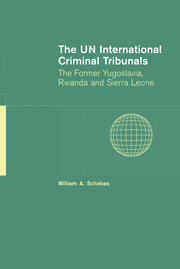Book contents
- Frontmatter
- Contents
- Preface
- Table of cases
- Table of legislative provisions
- List of abbreviations
- PART I Establishment of the tribunals
- 1 Creation of the tribunals
- 2 The legitimacy and legality of the tribunals
- 3 Sources of law
- PART II Jurisdiction
- PART III Substantive and procedural aspects of prosecution
- PART IV Organisation of the tribunals
- Bibliography
- Index
3 - Sources of law
Published online by Cambridge University Press: 05 June 2012
- Frontmatter
- Contents
- Preface
- Table of cases
- Table of legislative provisions
- List of abbreviations
- PART I Establishment of the tribunals
- 1 Creation of the tribunals
- 2 The legitimacy and legality of the tribunals
- 3 Sources of law
- PART II Jurisdiction
- PART III Substantive and procedural aspects of prosecution
- PART IV Organisation of the tribunals
- Bibliography
- Index
Summary
The United Nations International Criminal Tribunals sit astride an intriguing ambiguity, in that they seem related to both national law and international law. Their relationship with national law flows inexorably from their role as replacements for domestic courts. The overlap between the two systems is manifested within the statutes of the three tribunals by the need for such rules as primacy, in order to determine whether national courts or the international tribunals take precedence in the event of parallel or conflicting prosecutions, and non bis in idem, to govern situations where there is a possibility of multiple convictions. In other words, in terms of their functions, the tribunals are in many respects not very different from national courts. Inevitably, where the applicable law instruments are inadequate for the solution of legal problems, the international criminal tribunals draw upon national law. Here there are issues as to whether there is a preference for the national criminal law of the State that would ordinarily have jurisdiction, or for some hybrid of different systems of national law. All three statutes make specific reference to the possible application of the national criminal law of the State where the crime was committed. In the case of the ICTY and ICTR, this occurs in the sentencing provisions. The SCSL Statute gives national law a more prominent role, assigning a distinct role to Sierra Leone's criminal procedural law, as well as incorporating some offences drawn from the national law.
- Type
- Chapter
- Information
- The UN International Criminal TribunalsThe Former Yugoslavia, Rwanda and Sierra Leone, pp. 74 - 120Publisher: Cambridge University PressPrint publication year: 2006



